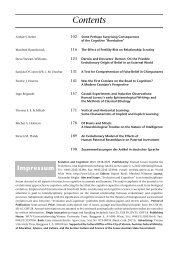The Seven Sins of Evolutionary Psychology - Konrad Lorenz Institute
The Seven Sins of Evolutionary Psychology - Konrad Lorenz Institute
The Seven Sins of Evolutionary Psychology - Konrad Lorenz Institute
Create successful ePaper yourself
Turn your PDF publications into a flip-book with our unique Google optimized e-Paper software.
A Continuing Critique <strong>of</strong> <strong>Evolutionary</strong> <strong>Psychology</strong>symbolization will work more effectively if there area greater number <strong>of</strong> neurons that can ‘crystallize’their tasks efficiently. Thus, we suspect that the evolutionaryadvantage may have been for individualsthat had more tissue in those brain regions, fastercommunicating neurons and perhaps the many factorsthat contribute to an exquisite plasticity thatcan become readily ‘gelled’. And perhaps little more,except for the fact that when these systems becomedisconnected from the deeper feelings <strong>of</strong> the righthemisphere, they tend to confabulate like crazy(PANKSEPP 2000c). It is most remarkable that psychologicalprocedures, such as psychoanalysis, can getbehind the confabulatory facade to deeper principles<strong>of</strong> reality (KAPLAN-SOLMS/SOLMS 2000). If oneputs our whole vision <strong>of</strong> human linguistic naturetogether, it may help explain why most <strong>of</strong> us tend tobe better speakers than listeners, and why so many<strong>of</strong> us are eager to speak faster and louder than thenext fellow, until there is little more than a blisteringcacophony <strong>of</strong> sounds.… “Till human voices wake usand we drown.” (T. S. ELIOT, <strong>The</strong> Love Song <strong>of</strong> J. AlfredPfrufrock).Parismony and Modularity<strong>The</strong> term modularity, at least as defined in the dictionary,provides no realistic perspective on the realcomplexities <strong>of</strong> the brain. It is a term that emergedfrom the field <strong>of</strong> engineering, where it was convenientto design complex circuits so they could berepaired by exchanging large components, asopposed to tracking down problems in the detailedconnections <strong>of</strong> spaghetti-like electronic circuits.Contrary to what PITCHFORD suggests, the term wasnever common in neurology, even though recentlywe do find even some <strong>of</strong> our respected neurosciencecolleagues falling into that sloppy usage ever morefrequently, now that it has become a meme <strong>of</strong> massiveproportions in so many academic circles. Noone wants to be left out <strong>of</strong> such discussions and alltoo many have come to casually use the term, eventhough neuroscience disciplines have had an abundance<strong>of</strong> apt brain terms (e.g., systems, networks orcircuits), long before the modularity idea was introducedto us by individuals who had little directexperience with brain research. This ‘digibit-module’metaphor (we assume some programmers stillfondly remember those useful electronic units prevalentin the 1970s) <strong>of</strong>fers no promising empiricalpay<strong>of</strong>fs. Modularity simply adds nothing useful toexisting neuroscience strategies or agendas, exceptperhaps a false sense <strong>of</strong> security that we have identifieda natural kind in the mind/brain without havingdone any neuroscience. Is it too much to ask all evolutionarypsychologists to simply drop the modularityconcept? Nothing would be lost and a lotcould be gained, as was evident in one recent contribution(DUCHAINE/COSMIDES/TOOBY 2001). If weneed such a concept, why not simply use a classicdesignator such as faculties, which simply helpsunderscore key problems that needed scientificattention.We submit that if we do not understand the ancestralminds that are still represented in the manyspecies with which we share the earth, we will notreally understand our own. Now that we understandthe massive genetic relatedness among all mammals,we must start to fathom how the basic brain processesthat all mammals share guide our humanmental activities. We suspect that when we begin toaccept the existence <strong>of</strong> certain primitive attentional,emotional and motivational faculties in humanmind/brains, we will find some parsimonious waysto solve many <strong>of</strong> the fascinating problems that evolutionistshave brought to the forefront <strong>of</strong> the psychologicalagenda. Let us simply share a few examples:As highlighted at the end <strong>of</strong> our target article, webelieve that human rape emerges substantially frompoorly socialized or sociopathic mind/brains thatare inclined to harm others for their own primitivesexual gratification. It will be an important neuroscienceproject to determine to what degree basicaggression systems in the human brain overlap withthose that mediate sexual urges. We already knowthat in certain species the overlap can be substantial(KOLLACK-WALKER/NEWMAN 1995).As evolutionary psychologists have compellinglyshown, males seek beauty and youth in their socio–sexual partners, while females seek signs <strong>of</strong> devotionand material investment. This may largely be due tothe fact that the primitive systems for male eroticurges are driven more by simple exteroceptive cues<strong>of</strong> nubility, not much different than those <strong>of</strong> otheranimals. Is there really much reason to propose anyintrinsic cognitive, decision-making circuitry? Mightfemales simply have the socio–neurological skills torespond to primitive social rewards more readilythan males—the pleasures <strong>of</strong> being together, eatingtogether, sleeping together and being tolerant <strong>of</strong>each other? <strong>The</strong>se are all primitive affective features<strong>of</strong> the mammalian condition that do not require sophisticatedspecial-purpose, cognitive ‘modules’.This is not to suggest that the origin <strong>of</strong> such choicesare not based on reproductive issues, but simply toEvolution and Cognition ❘ 73 ❘ 2001, Vol. 7, No. 1








